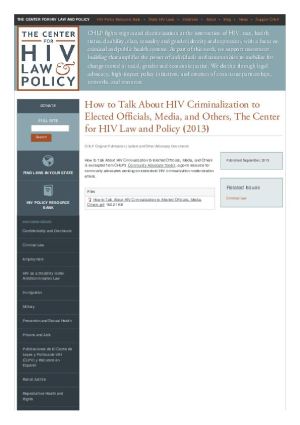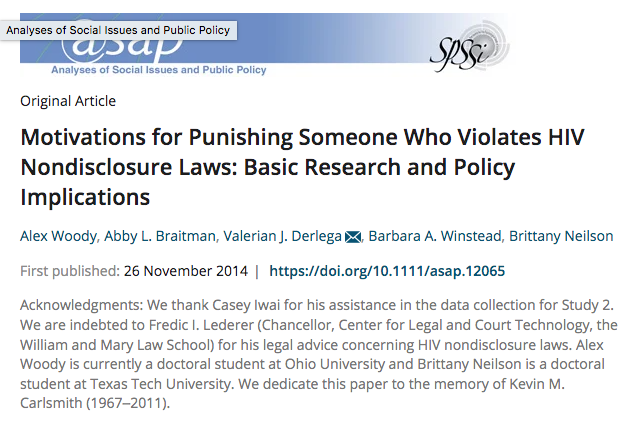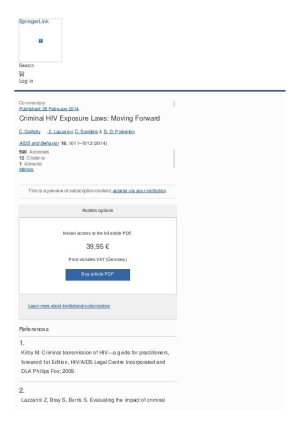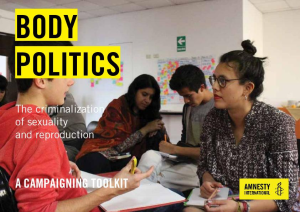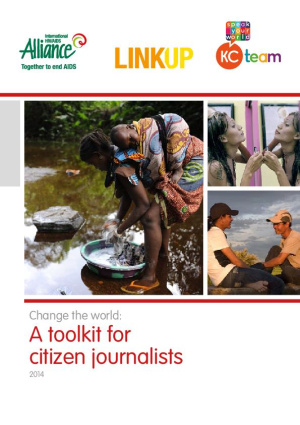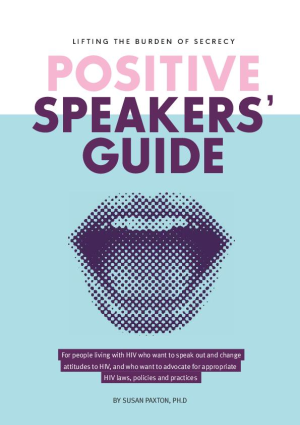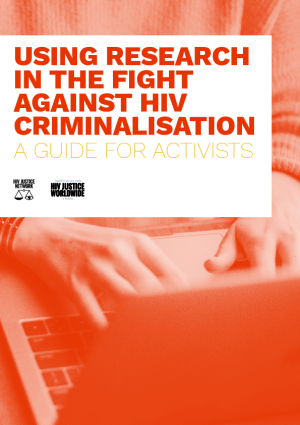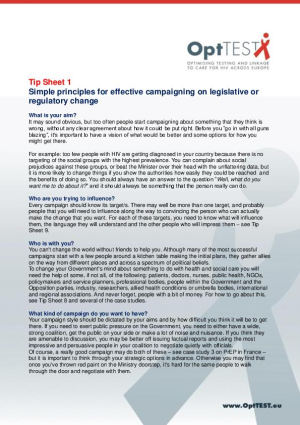This excerpt from the Center for HIV Law and Policy’s Community Advocate Toolkit, produced in 2013, lists talking points, each including a list of supporting resources and links. Covers many of the legal, public health, human rights, and social justice issues that HIV criminalization raises.
Communications and media
Framing arguments
These resources provide guidance on effective ways to communicate anti-criminalisation messages to stakeholders, the general public and others.
HIV Criminalization: Attitudes and Opinions of the American Public
Assessed current attitudes about HIV-related issues and tested messages that might be used to educate the general public and gain support for advocacy to modernise or repeal HIV criminalisation statutes. Suggests great opportunity to change public opinion but messaging must be simple, easy to understand and to the point. Information that current laws are inconsistent with scientific knowledge had considerable resonance, as does messaging that HIV laws unintentionally discourage testing, obtaining treatment and voluntary disclosure. Messages about civil liberties were least effective.
Motivations for Punishing Someone Who Violates HIV Nondisclosure Laws: Basic Research and Policy Implications
Suggests the general public is likely to endorse HIV criminalisation as fair and credible if used to punish actions that cause considerable harm. While it may not be possible to gain public support for a sweeping elimination of HIV criminalisation laws, a realistic advocacy agenda may involve arguments for limiting statutes and prosecutions to egregious cases where considerable harm is caused.
Criminal HIV exposure laws: Moving forward
Asks whether “after more than 25 years one has to wonder if researchers and advocates might be simply ‘preaching to the choir’”. Argues that advocacy will benefit from applying more time to understanding the systems and beliefs that allow HIV criminalisation to endure.
Body Politics: The Criminalisation of Sexuality and reproduction – A campaigning Toolkit
Provides concrete campaigning techniques such as mapping stakeholder participation and power, identifying advocacy targets, and building capacity
Change the world: A toolkit for citizen journalists
This training manual helps lay the foundation for civil society advocates to become citizen journalists. It brings together journalism skills and advocacy goals to help Key Correspondents share their perspectives and experience with decision makers and wider audiences to influence the discourse around HIV and related issues. The manual introduces the basic components of journalism; so correspondents can write their stories with accuracy and using a journalistic approach to improve the potential of being published in mainstream media. It is a ‘how to’ guide for individual study.
Lifting the Burden of Secrecy – Positive Speakers’ Guide
Manual for people who want to speak out and change attitudes to HIV and who want to advocate for appropriate HIV laws, policies and practices. Includes steps to a successful advocacy campaign and examples of how people living with HIV around the world have specifically advocated for policy change, and some of their success stories.
Using Research In The Fight Against HIV Criminalisation – A Guide for Activists
The purpose of this guide is to help advocates who want to use research in their activism. It is not a guide about how to conduct original research. Instead, it focuses on how to find, read and interpret research on HIV criminalisation, giving examples of how advocates have successfully used research to challenge HIV criminalisation.
Storytelling to Change Laws & Fight Stigma
During this workshop, The Elizabeth Taylor AIDS Foundation (ETAF) shared how storytelling has affected the modernization of HIV criminal laws across the United States and is now being used to change laws in other countries around the world.
OptTEST Tip sheet 1 – Simple principles for effective campaigning on legislative or regulatory change
Tips on how to run a successful media campaign to generate change,
When Saliva Is a Crime: Reforming Mississippi’s HIV Criminalization Law Utilizing the Center for Disease Control and Criminalization Law Utilizing the Center for Disease Control and Prevention’s Policy Analytical Framework
In this study, Mississippi’s existing policy was identified using the Center for Disease Control and Prevention’s Policy Analytical Framework, and three possible policy options were analyzed and scored based on public health impact, feasibility, and economic and budgetary impact. Results of this analysis strongly indicate that Mississippi Code ANN. § 97-27-14 should be amended to be scientifically accurate and include a criminalization clause based on the National HIV/AIDS Strategy for the United States goals and the United States Department of Justice Civil Rights Division best practices.

